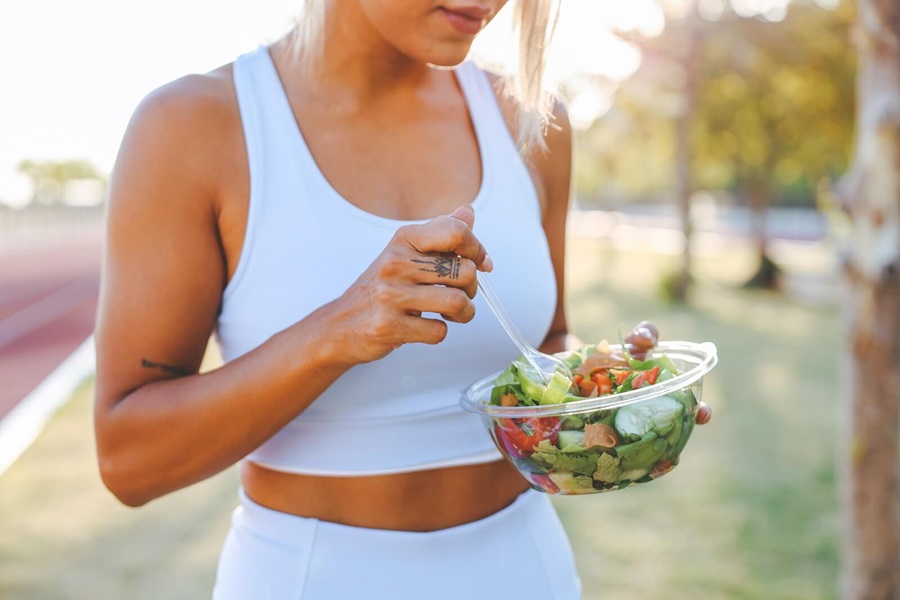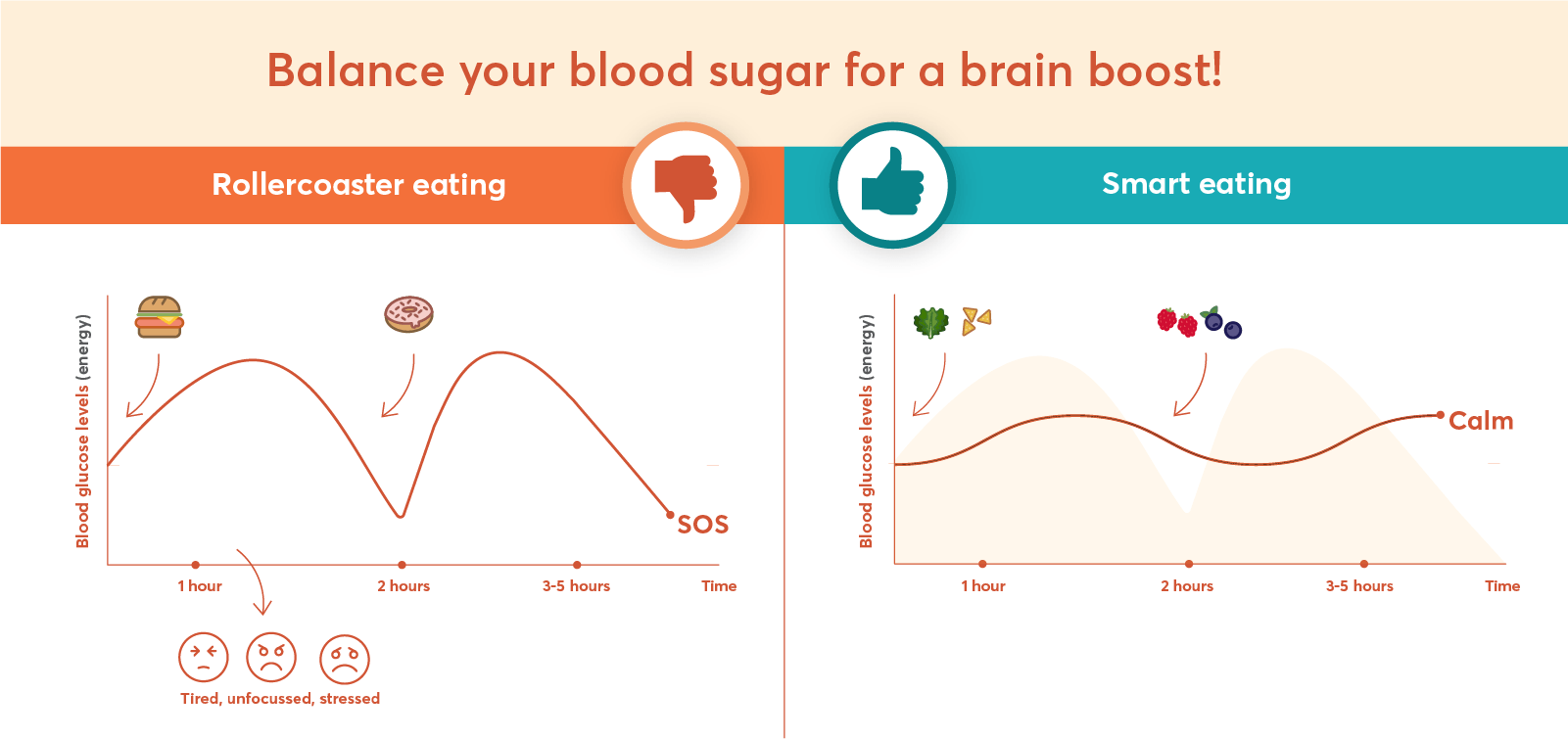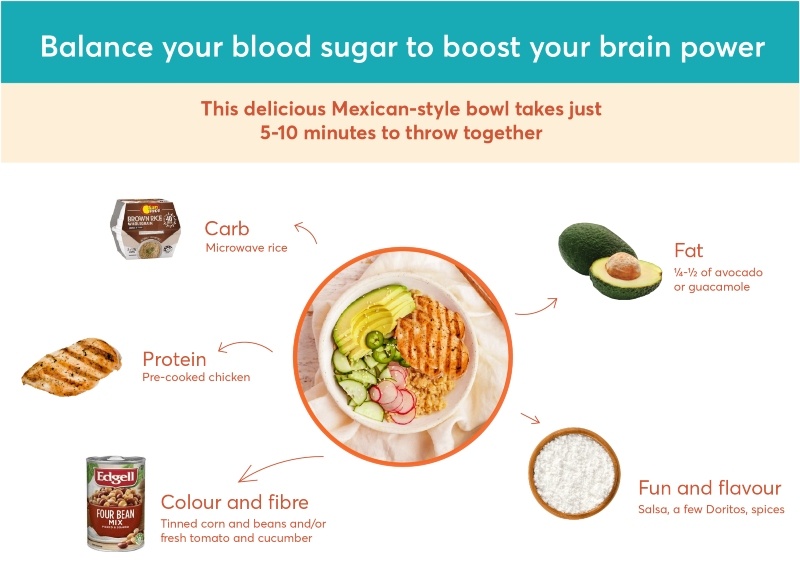- Home
- Mind & body
- Mood foods - nutrition for busy people
At CBHS we help you manage your health challenges. We believe in offering you the services, support and tools you need to live your best life.
Our Better Living Programs are available to support eligible members towards a healthier lifestyle. Each Better Living Program is subject to its own eligibility criteria.
Contact us for more information and to confirm your eligibility for a program.
Mood foods - nutrition for busy people

We’ve all heard the expression, ‘you are what you eat’ but do you know what that means? We think, react, and act how we eat! Making more balanced, healthy food choices in your day-to-day can have an amazing impact on your capacity to think, work and make decisions.
In fact, there’s actually a link between diet and mental health. Making smarter food choices can impact not just our bodies, but especially our mood and productivity.
Some food for thought:
- If possible, spend time on weekends planning your meals for the week - this will reduce the likelihood of ordering takeaway
- Cut up fruits and vegetables for the week ahead – aim for as many colours and types as possible
- When grocery shopping, aim to limit high-sugar, high-fat options, or leave them on the shelf
- Choosing tinned fish such as salmon and sardines is an easy way to increase the fish in your diet
- When purchasing pre-packaged or snack items, try to find options that have minimal added sugars, fats and additives
- Bring your lunch with you to work – this will not only save you money, but you get to choose what goes into it.

Guidelines and tips for maintaining a healthy diet and busy lifestyle:
1. Eat a wide variety of plant-based foods – the more colour and variety the better
- Cut-up fruits and vegetables into manageable pieces – aim for 4-6 different types and colours each day
- Grate vegetables and cook them into foods if you’re not a fan of raw veggies
- Add sauces/spices/herbs to make vegetables taste better – they do not have to be boring!
2. Choose wholegrain source of grains
- Choose ‘brown’ versions of grains, pasta and rice
- To cut down on cooking times, purchase microwaveable packs of rice and other grains
- Choose wholemeal or multigrain breads (aim for 4g/fibre per two slices minimum).
3. Include a source of protein at each meal
- Choose a wide variety of meat, chicken, fish, legumes or dairy at each meal
- Don’t be afraid to choose vegetarian protein sources
- High protein snacks include tins of fish, yoghurt (Chobani & YoPro are high in protein and low in additives), hummus, and boiled eggs.
4. Include a diverse range of unsaturated fats
- Cook with olive oil (extra virgin if you can)
- Try to include oily fish like salmon or mackerel 2-3 times per week (canned is fine!)
- Snack on portions of nuts (unsalted) – 30g or a small handful is one portion.
5. Seek to reduce how much processed foods you eat
- Have a range of healthy snacks at your desk to avoid snacking on less-desirable food options
- Don’t purchase high-sugar processed foods at the supermarket

6. Reduce and moderate alcohol and caffeine
- Try to limit alcohol consumption to two standard drinks per day with a minimum of two alcohol free days per week
- Try to limit coffee to two per day and not within three hours of bed – choose low caffeine options such as herbal teas or decaffeinated coffee.
“Rollercoaster eating can make you feel tired, irritable and stressed.”
Better brainpower foods
The busier our lives become and the older we get, the more important it is to give our brain the fuel it needs for clarity, focus and emotional resilience.
They’re not called ‘brain foods’ for nothing.
- Fatty fish like salmon is packed with omega-3 fatty acids essential for high brain function
- Leafy greens are packed with powerful antioxidants including vitamins A, C and E
- Turmeric is packed with curcumin, a powerful anti-inflammatory and antioxidant that supports healthy memory
- Eggs are the ‘rock stars’ of vitamin B12 and folic acid which are key for memory.
All information contained in this article is intended for general information purposes only. The information provided should not be relied upon as medical advice and does not supersede or replace a consultation with a suitably qualified healthcare professional.
Sources:
https://www.healthdirect.gov.au/food-drink-and-mental-health
https://www.cbhs.com.au/mind-and-body/blog/the-top-10-nutrition-tips-backed-by-science
https://www.cbhs.com.au/mind-and-body/blog/7-top-grocery-shopping-tips-for-a-healthier-you
https://www.cbhs.com.au/mind-and-body/blog/the-news-about-alcohol-and-cancer-which-might-shock-you
https://www.healthdirect.gov.au/blog/smart-ways-to-keep-your-brain-healthy
https://www.ncbi.nlm.nih.gov/pmc/articles/PMC2781139/
https://www.healthdirect.gov.au/blog/smart-ways-to-keep-your-brain-healthy
https://www.ncbi.nlm.nih.gov/pmc/articles/PMC2781139/
https://www.cbhs.com.au/mind-and-body/blog/the-top-10-nutrition-tips-backed-by-science
https://www.healthdirect.gov.au/food-drink-and-mental-health
Health and wellbeing
programs & support
You Belong to More with CBHS Hospital cover:
- Greater choice over your health options including who treats you
- Get care at home with Hospital Substitute Treatment program
- Free health and wellbeing programs to support your health challenges
Live your healthiest, happiest life with CBHS Extras cover:
- Benefits for proactive health checks e.g. bone density tests, eye screenings
- Keep up your care with telehealth and digital options
- Save on dental and optical with CBHS Choice Network providers
